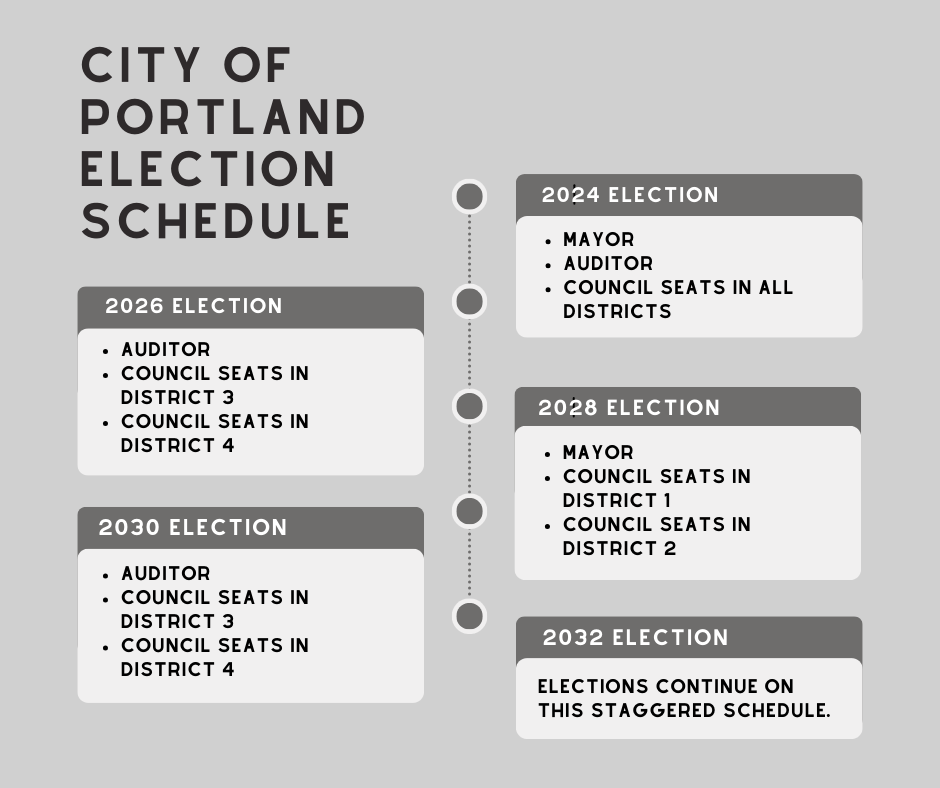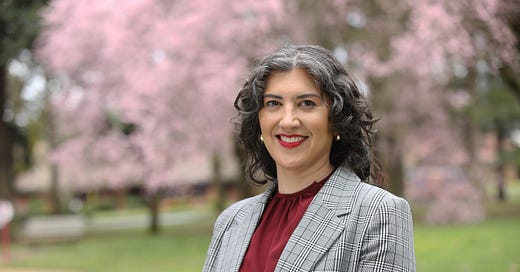Portland Auditor steps back from campaign finance oversight to seek re-election.
Simone Rede on the prospect of running for office three times in six years and what she's doing to ensure election integrity in the meantime.
While Mayor Wheeler says government reform has him too busy to run for another term, Portland Auditor Simone Rede is taking the opposite approach.
In her bid for reelection, Rede is temporarily stepping away from some pivotal duties.
Rose City Reform sat down with Auditor Rede to chat about what she’s doing – and not doing – to ensure the integrity of the 2024 election.
When Simone Rede won the auditor’s race last year, her victory came with a bit of a curveball. Voters’ decision to reform city government meant that her term would be cut from the standard four years to just two. The reason? The City Hall revamp puts all city seats up for election in 2024, including those whose terms have not yet expired.
“From a personal perspective, that was inconvenient. But there are also more important implications, particularly around my supervision of city elections,” says Rede, a former Metro auditor and a past committee chair of the Association of Local Government Auditors.
Because Rede is now a candidate herself, she has chosen to withdraw from watchdogging elections and campaign finance – a decision she says came with a certain degree of regret.
“There was some heartache there because I came to this office with a passion for democracy. The abbreviated term just made it clear that, okay, I won’t get to touch that now,” she tells Rose City Reform.
And here’s the other curveball: If Rede is re-elected in 2024, she’ll once again have to serve a two-year term. Why? The new city charter requires half of city officeholders to be elected in the midterm election and the other half during presidential election years. To kick that staggered schedule into gear, the auditor and council reps from the third and fourth districts must run again in 2026.
Here’s what Rede had to say about it.
What exactly is changing at the auditor’s office, and why?
I've formally delegated my authority to oversee elections and campaign finance to my chief deputy, Reed Brodersen. He will be overseeing the team that’s implementing ranked choice voting, and he will also continue to oversee our campaign finance investigation work.
We are doing this to create more distance between me and decisions related to the election so that no determinations will come from my desk during the election cycle.
How does it feel to step away from those duties?
It feels a little bit unfair because I was looking forward to it. Still, I completely understand the importance of perception for folks to trust in the process.
The good news is that Reed Brodersen brings an important equity lens to this work. The reforms that voters approved are meant to result in a more representative government, and Reed has experience doing agency-wide equity evaluation work in his previous position at Metro. He has already contributed to what will be the first fee waiver for city candidates in the United States.
Please say more about the fee waiver.
We're working with other city bureaus to implement a process that uses objective information to determine who's eligible to receive the waiver. The goal is to reduce barriers for folks who are thinking of running for office but are deterred by the filing fee and the requirement to gather signatures.
(Filing fees for candidates who don’t qualify for the waiver will be $75 for city council races and $100 for mayoral races. Alternatively, candidates may gather 500 signatures in lieu of the fee).
A little-known effect of the reform measure is that you must run for office three times in six years to stay in your position. How does that impact your work?
It has increased what I perceive as pressure to deliver. I don't have additional resources to do audits even though I have half the time to produce the results. I think my audit schedule has the potential to fulfill the promises I made to voters, but I can’t move any faster than I’m already moving. I also inherited some projects from my predecessor that I need to finish before I take on new audits. That’s something I’d like the public to know.
What role does the auditor’s office play in the city’s transition to a new governance system?
Anyone with an auditing role, including myself, should avoid getting directly involved in implementing the transition. We've been careful not to advise the transition team, but representatives from our office sit in on meetings, and we have synthesized some best practices for the transition team’s consideration. The reorganization gives our office a unique opportunity to point out, “Hey, here's a place where you could create more efficiency in city administration.”
As part of the new organizational chart, my office is also taking steps to take back the hearings office, which was historically part of the auditor's portfolio until 2020.
How do you envision the relationship between the auditor and the future city administrator, who will manage city bureaus under Portland’s reformed system?
I liken it to what I experienced in my previous role at Metro, where there's a legislative and an executive branch and a chief executive that’s the conduit for the auditor’s recommendations. Instead of dealing with the commissioner-in-charge, we’ll now go through the city administrator. I think that has the potential to make things less personal. One of the problems with our commission form of government is that too few people hold too many roles, and an audit of a bureau or a function overseen by one individual can be perceived as a personal attack.
On the other hand, research shows that auditors and city administrators sometimes view themselves as competitors because they both occupy the role of business process improvement experts in the organization. But it's important to remember that the auditor is independent from the administration. The auditor holds a watchdog function and is not necessarily a business partner to the executive or legislative branch.
What’s important to get right in our new system?
What I’m hearing from the community, not surprisingly, is the importance of civic engagement. The promise of multimember districts is that they could transform how people interact with the government. From an auditor’s perspective, it will be exciting to test the effectiveness of those changes to see if the new system results in improved access and participation for the public.
Our office is also working with the county, state, and city to offer more education about what it takes to run for office. Additionally, we anticipate that the novelty of the system will lead to an increase in campaign finance-related disputes, and we’ve contracted with outside counsel to help us with that.
It’s Day One for Portland’s brand-new city council, and it’s your job to explain the role of the auditor. What do you say?
Good practice! I would say that the auditor is here to provide an independent check on their city government. The auditor doesn’t set policy but evaluates how it's implemented and how well it's working. We are here to independently verify what was promised and what was kept, which helps inspire trust in the system. So, even though we will point out opportunities for improvement, we can be helpful to your cause. With that in mind, please use the auditor's work to further your agenda.

In other reform news:
This afternoon, Portland City Council will consider a resolution to adopt the city’s proposed new organizational chart. Crafted by Chief Administrative Officer Michael Jordan to align with Portland’s revised city charter, the blueprint consolidates city bureaus under a hired city administrator.
During a work session yesterday, city commissioners hinted at a flurry of potential amendments to the chart, prompting a seemingly exasperated Jordan to comment: “I’m feeling like a train is leaving the station, and I’m not sure I’m on it.”
Commissioners also seemed squeamish about the ongoing cost of operating the new governance system, projected at $23 million per year – up 130% from the current cost of approximately $10 million.
“This is a dramatic expansion of government,” said City Commissioner Rene Gonzalez, who last week tweeted that it was time for Mayor Wheeler to “rein in” the spending associated with government reform.
While the council has no influence over the size of the elected body or the overall power structure, commissioners have the power to tweak both staffing and programs.
Want to watch the hearing? Tune in here at 2 P.M. for what’s sure to be a spirited discussion.




